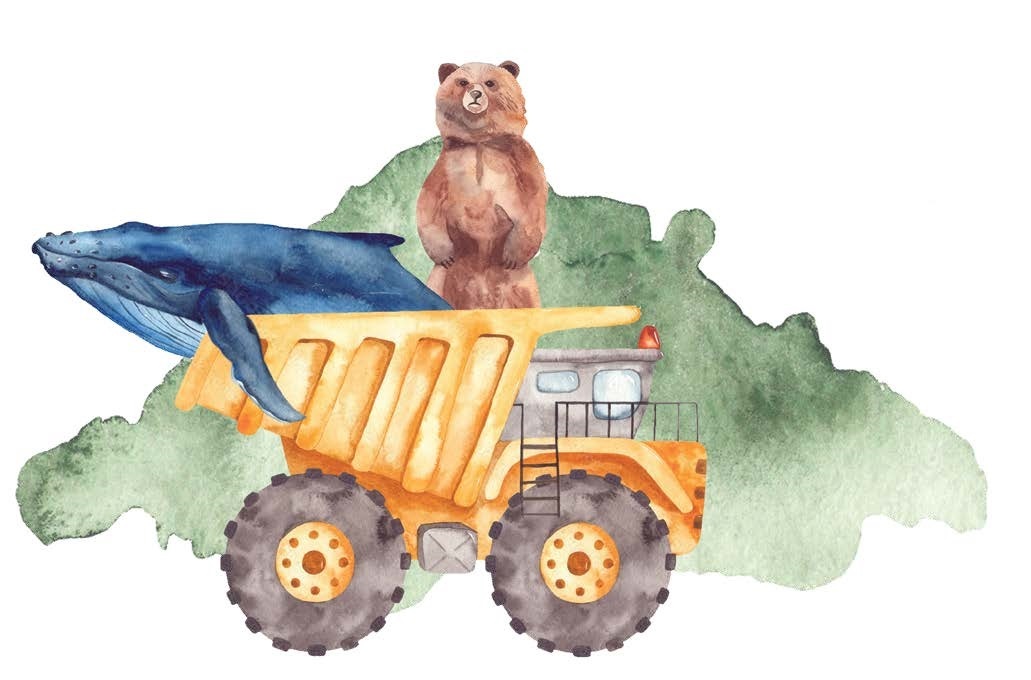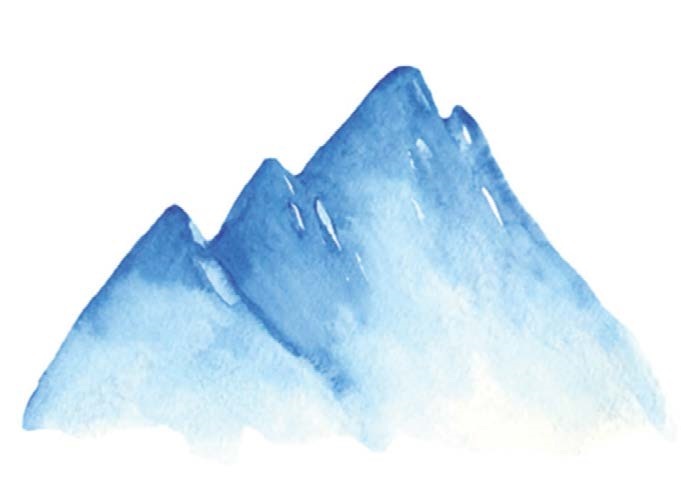
Watercolor painting of a bear and a whale in a construction vehicle.

Watercolor painting of a bear and a whale in a construction vehicle.
by Erica Watson
Summer 2023, FORUM Magazine
LAST SUMMER on a bus trip into Denali National Park with visiting family, I sat next to a man in his early twenties who seemed intent on disappearing into his window seat. As a Denali local, I often find myself straddling a line between exaggerated disinterest in yet another distant caribou, and the unbridled enthusiasm of an unpaid tour guide because, despite their familiarity, caribou are undeniably amazing.
As our bus slowed for the first bear sighting of the day, I offered to switch with my seatmate so he could join his family in pressing their phones to the window across the aisle. He politely declined. We stayed seated, taking no photos. “Do you ever feel like we’re the wildlife, and the animals are watching us?” he suddenly whispered, and I wasn’t sure he was speaking to me but I was the only one in earshot. “I think at our best, we have a kind of exchange,” I said.
He perked up a bit. I did too, and learned the following about him: he’d made an exception to his rule against flying for this family trip, and was dismayed to find that Indigenous history and climate justice was not front and center of the Alaska tourist experience. He wanted to know if there was a way to visit Denali and other landmarks that wouldn’t contribute to corporate profits. He wanted to know if this amount of being viewed was healthy for a bear.
To me, the “wow option” in Alaska tourism would be smaller and slower than it is now.
I had some answers but of course not all, and I share a lot of his questions. I’ve spent years living in uneasy proximity to industrial tourism, watching hundreds of thousands of people pass through on a rushed itinerary designed for efficiency rather than connection, and the strain it puts on travelers, industry employees, and infrastructure. I’ve heard friends, colleagues, and myself repeat the same tired jokes and semi-facts for an easy laugh. You probably know the lines: Alaska’s two seasons (winter and road construction), bring a slow friend in bear country, riffs on the size of Texas, or of mosquitoes.
Rather than insights into the place they’ve visited, many tourists bring home a cartoon image of an imaginary place, its people, animals, and economies. I worry that when we say tourism can take the place of the oil economy, we minimize the ways these extractions mirror each other. Travel writer Bani Amor outlines how travel media and advertising speaks to the audience’s “inner colonizer”: Alaska tourism ads offer a quick checklist of “untouched” and “untamed” landscapes to “discover” and “explore,” not unlike every industry that preceded it in extracting wealth and stories for profit. Too many visitors approach their travels with the entitlement of a prospector rather than the curiosity of a student.

Watercolor painting of mountains.
I believe that awe is a necessary place to start in connecting to a new place; I told my seatmate—and meant it—that there is always one person in even the most obnoxious crowd whose worldview changes with their first bear sighting. The experience might push them towards deeper connection with their own home place, or advocating for environmental protections nationally. That one person might be lost among forty voices joking about sacrificing their slow friend, but we have to trust one another in our capacity for awe, or else what are we doing? I’d been reading social justice dreamer and writer adrienne maree brown’s Emergent Strategy, and thinking about her categorization of systems and practices into “Wow!” and “That’s not wow. Why not go with the wow option?”
Too many visitors approach their travels with the entitlement of a prospector rather than the curiosity of a student.
To me, the “wow option” in Alaska tourism would be smaller and slower than it is now. I want to see an industry that puts Alaska’s ecological needs and limitations before the economic interests of corporate leaders or unimaginative legislators. Unregulated wastewater disposal, stressed animals, and exhausted travelers who barely know where they are is not wow, and all of us who live alongside tourism can and should imagine other possibilities. This might include fewer multinational cruise companies and more well-funded, tribally managed educational programs. It might look like visitors staying in one place long enough to notice a shift in twilight hours rather than a hustle from ocean to mountains without time to sleep or eat. It might look like a joke about construction season leading to a conversation about what it takes to maintain roads on melting permafrost, and uneven distribution of infrastructure resources throughout the state. It could look like a professionalized tourism workforce comprised of people who want to be here more than a few months at a time, who earn good money with benefits and build knowledge and skills to share about their home with nuance and compassion year after year, and conscientious visitors who are eager to learn and stay in conversation after they go home.
An exchange, rather than an extraction. ■
Erica Watson lives and writes on the boundary of Denali National Park with her partner and dog.
The Alaska Humanities Forum is a non-profit, non-partisan organization that designs and facilitates experiences to bridge distance and difference – programming that shares and preserves the stories of people and places across our vast state, and explores what it means to be Alaskan.
February 16, 2026 • Colleen Lomenick
January 28, 2026 • Polly Carr
January 20, 2026 • Shoshi Bieler